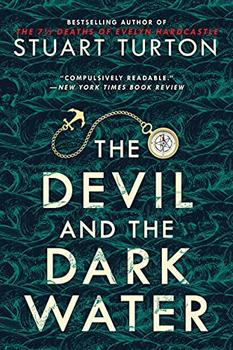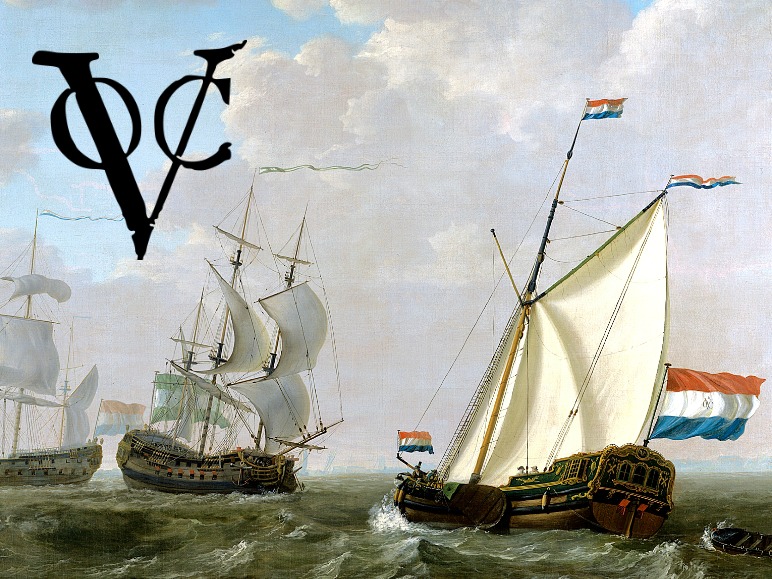Summary | Excerpt | Reading Guide | Reviews | Beyond the Book | Read-Alikes | Genres & Themes | Author Bio

Critics' Opinion:
Readers' Opinion:
First Published:
Oct 2020, 480 pages
Paperback:
Jul 2021, 448 pages
 Book Reviewed by:
Book Reviewed by:
Rachel Hullett
Buy This Book
This article relates to The Devil and the Dark Water
 In the prologue of The Devil and the Dark Water, Stuart Turton writes:
In the prologue of The Devil and the Dark Water, Stuart Turton writes:
In 1634, the United East India Company was the wealthiest trading company in existence, with outposts spread across Asia and the Cape. The most profitable of these was Batavia, which shipped mace, pepper, spices, and silks back to Amsterdam aboard its fleet of Indiaman galleons. The journey took eight months and was fraught with danger.
This richly detailed historical novel may center around a fictional detective, but the context of a fleet traveling from Batavia to Amsterdam is largely based in fact.
The United East India Company, or the Dutch East India Trading Company (known as "Verenigde Oost-Indische Compagnie" or VOC in Dutch), was founded in the Netherlands in 1602. It was sponsored by the Dutch government with the initial purpose to protect the national interest in trade in the Indian Ocean, which had been increasing among European powers in the 16th century. The company ultimately grew so successful that it became the most prosperous international corporation of its time.
Every year, two or three fleets would sail from the Dutch Republic to Asia, a voyage that took around eight months, at a speed of around 13 kilometers (eight miles) per hour. The ships, built specifically for this voyage and known as Indiamen or Eastindiamen, could hold hundreds of passengers, and would make a series of stops on their journey in order to pick up cargo. They doubled as battleships, a necessity to ward off pirates and also to protect from the rival companies, notably those from England, Portugal and France.
The United East India Company built a series of bases throughout Asia for trade operations; at the center of this network was Batavia (present-day Jakarta in Indonesia). Batavia, where The Devil and the Dark Water begins, was established as a trading site in 1619 when the port was conquered and colonized by company merchant Jan Pieterszoon Coen. The Dutch built a fort called Batavia Castle here, along with several warehouses. The outpost provided them with significant control over the region's trade.
The company's profit and influence only grew in subsequent years. In the mid-1600s, an average of 4,000 merchants and traders were sailing to East Asia from the Dutch Republic each year (the company commanded nearly 5,000 ships between its formation and decline). Profits from spice trading were significant, with the Dutch monopolizing the global trade of nutmeg and clove. The United East India Company became the only European power granted trading privileges by Japan, and it also established trading posts in Persia, Bengal and Siam (present-day Thailand), among other prominent locations. By the mid-17th century it was the richest trading company in the world.
By the late 17th century, however, as the Dutch escalated their efforts to conquer Java, fewer resources were allocated to the company and it began to decline as a trading power. In 1672, the Third Anglo-Dutch war broke out, which disrupted inter-European trade. This devastated the Dutch Republic, as it was relying on trade within Europe to secure the gold and silver coins used to purchase spices in Asia. By the 18th century, it had mostly transformed from a trading enterprise to a corporation existing to further the Dutch Republic's colonization of the East, and as it did so, debt and corruption grew.
The United East India Company was dissolved in 1799, nearly 200 years after its formation when its charter was allowed to lapse by the Dutch government.
17th century United East India Company ships, courtesy of Around Amsterdam
Filed under People, Eras & Events
![]() This "beyond the book article" relates to The Devil and the Dark Water. It originally ran in November 2020 and has been updated for the
July 2021 paperback edition.
Go to magazine.
This "beyond the book article" relates to The Devil and the Dark Water. It originally ran in November 2020 and has been updated for the
July 2021 paperback edition.
Go to magazine.





The Flower Sisters
by Michelle Collins Anderson
From the new Fannie Flagg of the Ozarks, a richly-woven story of family, forgiveness, and reinvention.

The House on Biscayne Bay
by Chanel Cleeton
As death stalks a gothic mansion in Miami, the lives of two women intertwine as the past and present collide.

The Funeral Cryer by Wenyan Lu
Debut novelist Wenyan Lu brings us this witty yet profound story about one woman's midlife reawakening in contemporary rural China.
Your guide toexceptional books
BookBrowse seeks out and recommends the best in contemporary fiction and nonfiction—books that not only engage and entertain but also deepen our understanding of ourselves and the world around us.